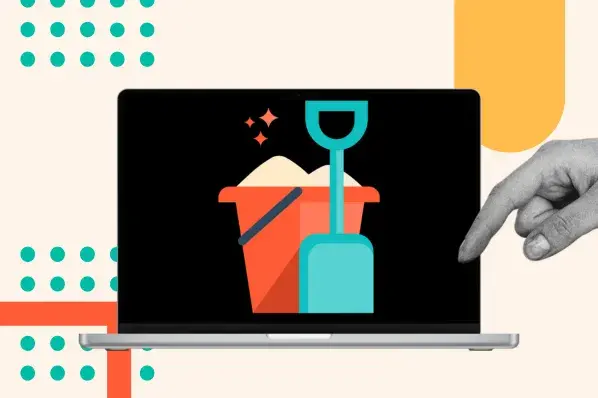Grab your neck brace: Marketers are getting whiplash with Google’s recent announcement signaling its apparent flip-flopping on third-party cookies.
Back in 2019, Google announced it would slowly phase out third-party cookies. It skipped past its own deadlines three separate times, and then on June 22, 2024, Google announced it wouldn’t be phasing out third-party cookies after all.
To find out if this was good news or bad news, I asked a 探花精选 product SEO who’s known for his spicy opinions if he had any hot takes on third-party cookies. He responded with a GIF of Lisa Simpson taking off a necklace and saying, “Hold my pearls!”

But first, some necessary background.
Table of Contents
- A Very Abbreviated History of Third-party Cookies
- Why Google Wanted to Phase Out Third-Party Cookies
- Cookie Controversy: What Marketers Thought About the Phase-out Plan
- Why Google Isn't Phasing Out Third-Party Cookies
- What's Next for Marketers and Advertisers

Free Marketing Plan Template
Outline your company's marketing strategy in one simple, coherent plan.
- Pre-Sectioned Template
- Completely Customizable
- Example Prompts
- Professionally Designed
Download Free
All fields are required.

You're all set!
Click this link to access this resource at any time.
A Very Abbreviated History of Third-party Cookies
Back in the olden days of 2017, a domain could set cookies and collect data on you without your explicit consent. How those domains handled that data was a crapshoot, with no reliably consistent guidelines or regulations.
Among (many) other things, cookies give marketers the kind of information you can build a whole digital strategy around: basic demographics, how users find their way to your site, how far they get into the marketing funnel.

When GDPR sauntered into town a year later, the world scrambled to comply with the new privacy mandate. (You may recall your inbox overflowing with emails updating you on new privacy policies. Perhaps you also shared my shock at the appalling number of websites you’d given your email address to over the years.)
Nominally an EU policy, the General Data Protection Regulation came into force in 2018 and applied to any entity that handled data of EU citizens.
Globalization guaranteed that meant “anybody with a website.” Advertisers wept.
Even optimistically assuming that most entities — anybody with a website, advertisers, marketers, publishers, the whole shebang — had been acting in good faith pre-2018 with regards to user data and privacy, the GDPR fundamentally changed the way we collect data on the internet.
To be reductive, the 261 pages of data privacy and security law require that organizations consider data protection “by design and by default.”

Free Marketing Plan Template
Outline your company's marketing strategy in one simple, coherent plan.
- Pre-Sectioned Template
- Completely Customizable
- Example Prompts
- Professionally Designed
Download Free
All fields are required.

You're all set!
Click this link to access this resource at any time.
Prior to the GDPR, it was possible for bad actors to play fast and loose with your data; now online privacy is a cornerstone of any digital marketing plan. (And if it’s not a cornerstone, you could face tens of millions of dollars in fines.)
There are a number of different kinds of web cookies, but for purposes of untangling Google’s 2024 announcement, first- and third-party cookies are where we’ll focus.
First-Party Cookies
A first-party cookie is a code that’s stored on a user’s computer when they visit a website. This cookie is often used to improve user experience like remembering passwords and the items in your Amazon cart.
If you’ve used something like Google Analytics 4 (GA4) or Matomo, you’ve seen the kind of analytics data that first-party cookies can collect: the number of web sessions on a page, what pages users click on, browser types, geographical demographics, or even referring websites where visitors clicked a link to your site's URL.
This can be useful as you’re developing or automating your marketing strategies.

Free Marketing Plan Template
Outline your company's marketing strategy in one simple, coherent plan.
- Pre-Sectioned Template
- Completely Customizable
- Example Prompts
- Professionally Designed
Download Free
All fields are required.

You're all set!
Click this link to access this resource at any time.
Information collected from a given site has limited visibility — if you run the site, you can only see what visitors do on your site, and it’s not tied to personally identifiable information. If you’re a site visitor, the information collected by 探花精选.com, for example, won’t be used to target ads to you on Facebook.
Third-Party Cookies
Third-party cookies are tracking codes placed on a web visitor's computer after being generated by another website other than your own.
Unlike first-party cookies, third-party cookies effectively follow users around the web. More technically, the third party that owns the tracking code — like an advertiser — also owns the collected information.

That’s great news if you’re the advertiser. Third-party cookie data gives you much broader visibility than the first-party cookies on your own site. Now you can get info about your visitors’ overall online behaviors, like the websites they frequent, purchases they make, and political or social interests.
Such detailed data lets you build robust visitor profiles that you might use to create a retargeting list and send ads to people with similar profiles.
While first-party cookies are accepted automatically, visitors must be informed that they are accepting a third-party cookie due to the amount of data that companies can retain from them.
And now for the hot takes I promised you.
Why Google Wanted to Phase Out Third-Party Cookies
, 探花精选 product SEO and Simpsons fan, tells me, “Third-party cookies are a necessary evil. They’re so evil and overdone that we really don’t know how to shift away from them in a way that’s respectful of people’s privacy.”

He reminds me that Apple turned its consumer-focused privacy features — like the “nutrition label” on all apps in the App Store that shows you how your data will be used — into a competitive advantage. (Whether or not that’s earned is a hot take for another day.)
So when the privacy tide began to turn in 2018, “Google could see where Apple is going with their privacy focus on the consumer,” Pan says. And Google needed to keep up.
Additionally, Google’s ability to operate at full strength in the EU has been somewhat hobbled by strict GDPR policies.
An Austria-based group called — it stands for what you think it does — claims credit for the hefty 50 million euro ($55.6M) fine that the EU levied against Google in the early days of the GDPR. Tech behemoth versus geopolitical behemoth, game on.

Free Marketing Plan Template
Outline your company's marketing strategy in one simple, coherent plan.
- Pre-Sectioned Template
- Completely Customizable
- Example Prompts
- Professionally Designed
Download Free
All fields are required.

You're all set!
Click this link to access this resource at any time.
More recently, the beta version of AI Overviews (called Search Labs) was made available in nine countries, none of which were in the EU. The U.K, famously not in the EU, has more flexible AI policies, enabling AIO to launch there in August 2024.
All of which is to say: Phasing out third-party cookies in favor of more GDPR-friendly data collection is ostensibly to Google’s benefit so EU citizens could use its full suite of tools. And so it could keep up with Apple.
Privacy Sandbox
In its 2020 phaseout announcement, Google said it would begin developing its own privacy sandbox, an initiative that “aims to create technologies that both protect people’s privacy online and give companies and developers tools to build thriving digital businesses.”
The claims three primary goals across the web and Android devices:
- To build new technology to keep user information private.
- Enable publishers and developers to keep online content free.
- To collaborate with the industry to build new internet privacy standards.
The Electronic Frontier Foundation (EFF), a loud critic of Google’s privacy policies, as a Chrome feature that, “among other things, exchanges third-party cookies — the most common form of tracking technology — for what the company is now calling Topics.”
Cookie Controversy: What Marketers Thought About the Phase-out Plan
Imagine the sound of thousands of marketers blowing a giant raspberry.
The phase-out plan was unpopular among many advertisers and marketers for obvious reasons — it makes our job harder.
Pan says, “As marketers, we really like our data. We want to know if something is effective.”
“And that’s the blessing of digital marketing — you can track really granular things and determine whether money spent in one place resulted in a return on investment.”
In a survey from 2022, when marketers were anticipating third-party cookie deprecation, , which provided 探花精选 with exclusive data, discovered that:
- 41% of marketers believed their biggest challenge would be their inability to track the right data.
- 44% of marketers predicted that they would need to increase their spending by 5% to 25% to reach the same goals as the previous year.
- 23% of marketing experts planned on investing in email marketing software due to Google’s new policy.

Free Marketing Plan Template
Outline your company's marketing strategy in one simple, coherent plan.
- Pre-Sectioned Template
- Completely Customizable
- Example Prompts
- Professionally Designed
Download Free
All fields are required.

You're all set!
Click this link to access this resource at any time.
Why Google Isn't Phasing Out Third-Party Cookies
The TLDR is that we don’t really know for sure.
Pan has a guess: “If you think about it, the web is fueled by ads. And that’s what keeps the web ecosystem working.”
He presents Exhibit A, a GDPR-compliant pop-up on the website of France 24, a French news channel. There are 244 partners with whom France 24 might share your data. Two-hundred forty-four.

Some critics of the 2020 phaseout announcement accused the tech giant of limiting advertisers' options. Others said that deprecating third-party cookies gave Google an unfair advantage since it has access to so much data from first-party cookies.
Anthony Chavez, the VP of Privacy Sandbox, that Google would no longer be phasing out third-party cookies.
This comes just three months after an — hasn’t, as of this writing, deleted the line about Chrome “responsibly phasing out third-party cookies.”

Chavez cited feedback from “a wide variety of stakeholders,” including government regulatory bodies, publishers, civil society, and advertisers. Without walking back Privacy Sandbox, Chavez proposes “an updated approach that elevates user choice.”
He continues: “Instead of deprecating third-party cookies, we would introduce a new experience in Chrome that lets people make an informed choice that applies across their web browsing.”

There aren’t any specifics yet as to what that looks like, nor does Chavez provide a timeline for the rollout.
What's Next for Marketers and Advertisers
Marketers have had four years to prepare for third-party cookie deprecation, so even though it’s no longer happening (for now), millions of dollars have been spent exploring other options.
Older strategies like contextual advertising may become more popular. A 2024 survey in the U.K. indicated that marketers are spending more money on alternatives like direct TV and OTT, which saw a .
As for Pan, his hot take is that the third-party cookie phaseout might not have been such a bad thing for marketers. And even if third-party cookies are here to stay, there’s something to be said for more creativity and less data:
“Everyone has to really wrangle with incomplete data — and for some marketers, that’s a great thing.
“That means we go back to being more creative. It means we start to search for marketing messages that focus more on storytelling and the user’s needs and less of the lever-pulling optimizations that you use when you’re too narrowly focused on ROI.
“It means shifting marketing more to the arts, and less to the science.”
Disclaimer: This blog post is not legal advice for your company to use in complying with EU data privacy laws like the GDPR. Instead, it provides background information to help you better understand the GDPR. This legal information is not the same as legal advice, where an attorney applies the law to your specific circumstances, so we insist that you consult an attorney if you’d like advice on your interpretation of this information or its accuracy. In a nutshell, you may not rely on this as legal advice, or as a recommendation of any particular legal understanding.
Editor's note: This post was originally published in February 2020 and has been updated for comprehensiveness.

Free Marketing Plan Template
Outline your company's marketing strategy in one simple, coherent plan.
- Pre-Sectioned Template
- Completely Customizable
- Example Prompts
- Professionally Designed
Download Free
All fields are required.

You're all set!
Click this link to access this resource at any time.


![How to Nail First-Party Data Strategy According to a Google Director of Product Management [+ New Data]](https://53.fs1.hubspotusercontent-na1.net/hubfs/53/first-party-data-strategy.webp)

![6 Ways to Earn Trust From Consumers Who Share Data With Your Brand [Data]](https://53.fs1.hubspotusercontent-na1.net/hubfs/53/person%20shares%20data%20with%20brand.png)


